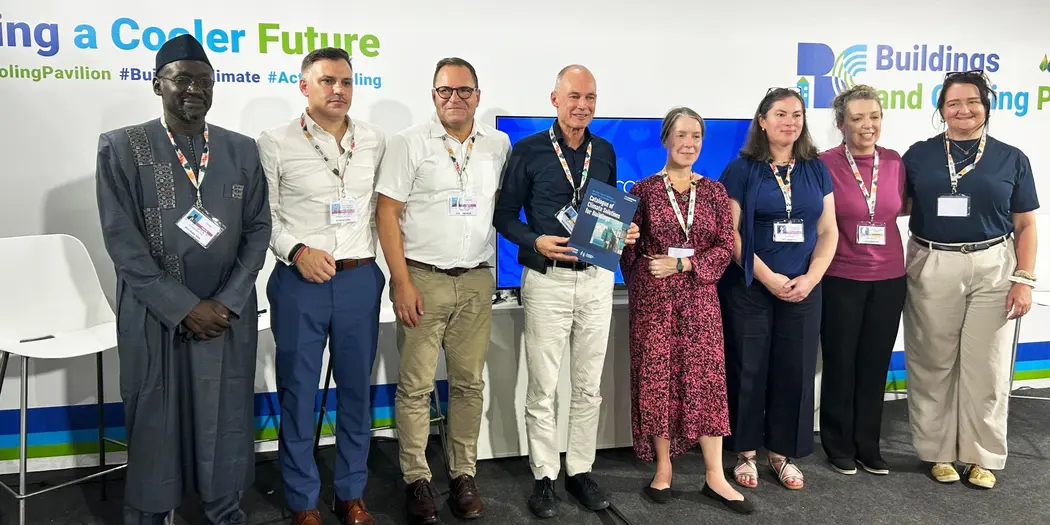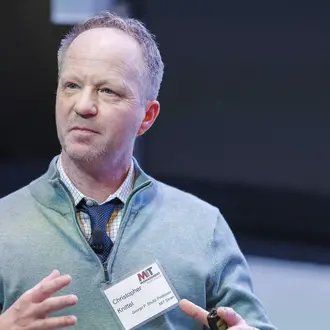MIT Climate Policy Center Contributes to New UN Policy Brief on Climate Technologies for the Building Sector
Credit: Global ABC. Left to right: El Hadji Ibrahima Diop, Robert Rossi, Dietram Oppelt, Bertrand Piccard, Bethany Patten, Zoe Norgate, Mary Dickinson, Audrey Nugent.
The MIT Climate Policy Center is a coauthor of a new United Nations policy brief providing advice and recommendations about technologies available to reduce greenhouse gas emissions and improve climate resilience in the buildings sector, as well as the public policies that can accelerate deployment of those technologies. The new policy brief from the Technology Executive Committee (TEC) of the United Nations Framework Convention on Climate Change (UNFCCC) is titled Deploying Established Climate Technologies and Solutions for Buildings and is available for download from the UNFCCC website.
The policy brief, which was released on November 13, 2025 at the COP30 global climate summit in Belém, Brazil, was jointly authored by the UNFCCC TEC, the Global Alliance for Buildings and Construction (GlobalABC), and the MIT Climate Policy Center. Specifically, the brief was developed for the TEC, and under its guidance, by: Bhava Dhungana (UNFCCC Secretariat); Maia Tskhvaradze (UNFCCC Secretariat); Drew Story (MIT Climate Policy Center); Jonathan Duwyn (GlobalABC Secretariat), and Clara Camarasa (UN Environment Programme’s Copenhagen Climate Centre).
Drew Story, Policy Director of the MIT Climate Policy Center and one of the researchers who prepared Deploying Established Climate Technologies and Solutions for Buildings, explained that the new UNFCCC TEC policy brief provides information and recommendations for policymakers from all climatic zones and levels of economic development. The aim of the policy brief, Story said, is to give policymakers information about climate technologies that are high-impact, cost-effective, and market-ready.
“Using this policy brief, countries can choose policy options and climate technologies that work for them,” Story said. “Having an authoritative, evidence-based set of recommendations makes it easier for policymakers to make those decisions and weigh the pros and cons of different technologies alongside other policy objectives that they may have.”
“We are honored to collaborate with the UNFCCC TEC and GlobalABC to provide practical information that will help policymakers from around the globe make sound decisions about which technologies will be most useful in their region for reducing emissions from the building sector,” said Bethany Patten, Executive Director of the MIT Climate Policy Center. “Contributing to this policy brief is an excellent fit with our Center’s mission of serving as a trusted, non-partisan resource for policymakers who seek to advance evidence-based climate policy in the next decade.”
The release event for the new policy brief at COP30 began with introductory remarks by: Ariesta Ningrum, Director of the Climate Technology Centre and Network of the Climate Change Division of the UN Environment Pogramme (UNEP); Dietram Oppelt, Chair of the UNFCCC TEC; and Bertrand Piccard, President of the Solar Impulse Foundation, which launched its new Catalogue of Climate Solutions for Buildings in conjunction with the event.
“The buildings sector lies at the heart of the global transition toward a low-emission and climate-resilient future, and is indispensable to achieving global net-zero emissions by mid-century,” Oppelt said. “Responsible for nearly 40 percent of global energy-related CO₂ emissions, buildings offer one of the most impactful opportunities to achieve the goals of the Paris Agreement.”
Following the introductory speakers, Patten moderated a discussion, by an international panel of experts from the public, private, and nonprofit sectors, on the topic of advancing climate technologies and policies and leveraging financing mechanisms to decarbonize the building sector. The panelists included: El Hadji Ibrahima Diop, UNFCCC National Designated Entity, Senegal; Mary Dickinson, Regional Sustainability Practice Leader, Perkins & Will; Robert Rossi, President of Schneider Electric Brazil; Zoe Norgate, Deputy Director, International Net Zero, Green Finance and Capability Team, UK Department for Energy Security & Net Zero; and Audrey Nugent, Global Advocacy and Campaigns Director for the World Green Building Council (WorldGBC).
Deploying Established Climate Technologies and Solutions for Buildings is the first of two planned UNFCCC TEC policy briefs that MIT Climate Policy Center researchers are contributing to aimed at reducing emissions and increasing resilience in the building sector. Story explained that the second brief, which is currently in a draft stage, will provide policy recommendations for collecting reliable building data to demonstrate climate performance, reduce investment risk, and attract funding for projects designed to reduce the climate impact of buildings.




